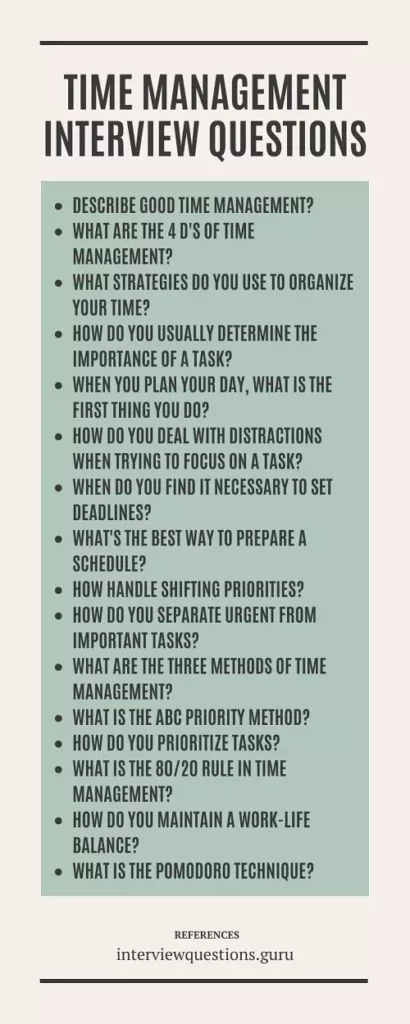In this blog post, we’ve created 20+ time management interview questions with sample answers that can be asked during the interview. If you are an interviewer, you can determine if someone has good time management skills by asking time management questions shared below.
Table of Contents
Time Management Interview Questions
Describe good time management?
Sample Answer: Good time management where we can prioritize tasks based on what needs to be done and on time.

What are the 4 D’s of time management?
Sample Answer: The four D’s of time management are:
Do
Do the task that will produce the most significant results and meet deadlines.
Delegate
Delegate tasks to others if you can’t do everything yourself, or it’s not your responsibility to complete them.
Drop
Let go of less important items on your to-do list, so you have more time for critical projects.
Delay
If possible, don’t start a task if you cannot focus. When you can concentrate, then complete it.
What strategies do you use to organize your time?
Sample Answer: Some common strategies I use to organize my time include creating a schedule, using a planner, setting deadlines, and creating to-do lists.
How do you usually determine the importance of a task?
Sample Answer: I rank tasks by how urgent they are, how long they will take to complete, or how much effort it requires.
When you plan your day, what is the first thing you do?
Sample Answer: My daily schedule involves reviewing emails, attending meetings, having lunch, and checking off tasks on to-do lists.
How would you handle it if a coworker asked for your help with something that wasn’t urgent or important?
Sample Answer: I generally ask what the task is before deciding whether I can help. Depending on my availability, I tell the coworker that I am too busy and can’t help.
How do you deal with distractions when trying to focus on a task?
Sample Answer: There are various ways I deal with distractions. Sometimes I put on headphones, work in a quiet environment, or take breaks every once in a while to avoid becoming overwhelmed.
When do you find it necessary to set deadlines?
Sample Answer: I set deadlines when there is a need for a task to be completed by a specific time. The task is urgent or part of a larger project with several smaller tasks with their deadlines.
What is the best way to handle a situation where you have too many things to do?
Sample Answer: In this type of scenario, I first assess which tasks are most important and then focus on completing those first. Sometimes it is helpful to delegate some tasks or even drop them from my list entirely.
What’s the best way to prepare for a meeting?
Sample Answer: When preparing for a meeting, it’s essential to consider the purpose of the schedule. Then, determine who should be invited and what items should be included on the agenda. Finally, create an outline of topics discussed at the meeting.
What are the three methods of time management?
Sample Answer: Some of the most popular time management methods include planning, prioritizing tasks, and avoiding distractions.
What is the ABC priority method?
Sample Answer: The ABC priority method is a system where tasks are prioritized based on the level of importance. Tasks that are urgent and important are A priorities, while less critical but still important tasks are B priorities, and so on.
What is the Eisenhower Matrix?
Sample Answer: The Eisenhower Matrix is a tool used to help prioritize tasks by urgency and importance. It consists of four quadrants, where tasks are prioritized as either important and urgent (top left), important but not urgent (bottom right), unimportant but urgent (top right), or unimportant and not urgent (bottom left).
How do you organize your time?
Sample Answer: I plan my day by first looking at emails and scheduling meetings, then checking off any tasks on a to-do list.
How do you prioritize tasks?
Sample Answer: I prioritize tasks by determining the importance of each task and then complete them in that order.
How do you separate urgent from important tasks?
Sample Answer: Urgent tasks are those that need to be completed right away, while important tasks are those that have a more significant impact on long-term goals.
How handle shifting priorities?
Sample Answer: To handle shifting priorities, it’s important first to assess the new priority and then determine what tasks can be pushed back or dropped from the list.
When is it necessary to set deadlines?
Sample Answer: Deadlines are often used when there is a need for a task to be completed by a specific time. It might be because the task is urgent or part of a larger project with several smaller tasks with their deadlines.
What is the 80/20 rule in time management?
Sample Answer: The 80/20 rule in time management states that 20% of the tasks on your list will account for 80% of the results. It means that you should focus your time and energy on the most important tasks.
How do you maintain a work-life balance?
Sample Answer: To maintain a work-life balance, I set boundaries between personal and professional life. It might mean setting specific times when you’re available for work calls or emails and spending time away from work to relax and recharge.
What is the Pomodoro Technique?
Sample Answer: The Pomodoro Technique is a time management technique that focuses on working in short, focused bursts. It consists of 25-minute work periods with five-minute breaks between each one.

| Must Read |
Time Management Skills
Do you get so busy that it’s hard to find the time for things like eating or sleeping? If so, you’re not alone. Many people struggle with getting everything done in a day. But one way to increase productivity is by better managing your time. Here are some of the skills you must develop to manage time better:
- Start your day early.
- Take breaks.
- End your day with a plan.
- Get enough sleep.
- Communication.
- Delegation.
- Stay focused.
- Stay self-aware.
- Apply the 80/20 rule.
- Goal-setting.
- Prioritization.
- Stay Organized.
- Planning.
- Stress management.
- Set boundaries.
- Eliminate distractions.
- Say no.
Below are some of the resources (Tips, Apps, Books, Ted Talks Videos) that can help you develop time management skills.
- Books on Time Management Skills.
- Tips for managing time better.
- Apps that can help you manage time and tasks.
- Ted Talks Videos on Time Management Skills.
Books on Time Management Skills
- The Now Habit: A Strategic Program for Overcoming Procrastination and Enjoying Guilt-Free Play.
- Getting Things Done: The Art of Stress-Free Productivity.
- First Things First by Stephen R. Covey, A. Roger Merrill, Rebecca R. Merrill.
- Eat That Frog! 21 Great Ways to Stop Procrastinating and Get More Done in Less Time.
- Deep Work: Rules for Focused Success in a Distracted World.
- The Time Trap: The Classic Book on How to Succeed with Time Management.
- How To Stop Worrying and Start Living by Dale Carnegie.
- The One Minute Manager by Kenneth H. Blanchard, Spencer Johnson.
- Who Moved My Cheese? An Amazing Way to Deal with Change in Your Work and in Your Life.
- Pomodoro Technique Illustrated: The Easy Step-By-Step Guide to Improved Productivity.
- The Power of Full Engagement: Managing Energy, Not Time, Is the Key to High Performance and Personal Renewal.
Tips for managing time better
- To better manage your time, try these simple tips:
- Use a daily planner or app to keep track of deadlines and meetings.
- Create a daily schedule.
- Make a list of short-term goals and long-term goals.
- Set a timer for specific tasks and try to stick to the time limit you’ve selected. When you have a list of tasks to complete, it’s easier to visualize what you need to do and when.
- Delegate or outsource tasks whenever possible. Don’t waste time on small tasks that you can easily delegate.
- Break down larger tasks into smaller, more manageable parts that are easier to complete.
- Take regular breaks throughout the day to increase productivity. Using the Pomodoro technique, 25 minutes sessions with several breaks throughout the day to keep yourself focused.
- Schedule time for social media browsing/email checking.
- Create a comfortable space for yourself where you can concentrate without distractions.
- Avoid multitasking whenever possible.
- Practice self-care by scheduling time for activities that make you happy and help you relax (like reading, going for walks, or listening to music).
- These are just a few of the many time management tips out there. By implementing some or all of them, you’ll be able to manage your time and complete tasks better faster.
- It’s important to use these tips and practice them to become second nature! The following list contains some time management tools that can be incredibly useful in your everyday life.
Apps that can help you manage time and tasks
- Todoist
- Toggl Track
- TimeTree
- Trello
- Calendar
- Remember the Milk
- Evernote
- Rescue Time
- MyLifeOrganized
- TimeTree
- Todoist
- Clockify
- Focus Booster
- Focus@will
Time Management (Ted Talk Videos)
https://www.youtube.com/watch?v=WXBA4eWskrc&t=4s
https://www.youtube.com/watch?v=y2X7c9TUQJ8
Conclusion
If you are an employer or hiring manager, please share this blog post on your social media channels so that people will know what they should expect during their interviews at your company. We hope you found this list of time management interview questions and sample answers helpful.